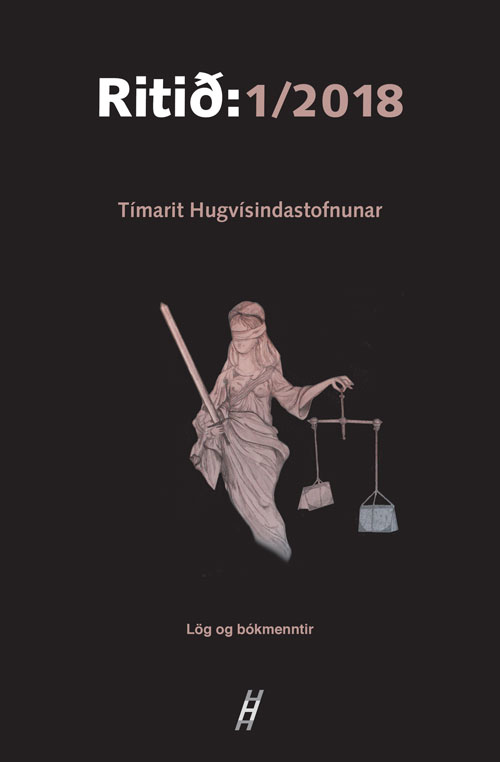Loftur Helgason fer til Björgvinjar
Atvikalýsing í samhengi við sögu stjórnskipunarbreytinga á síðari hluta 13. aldar
Abstract
Í greininni er frásögn Árna sögu af ferð Lofts Helgasonar til Björgvinjar árið 1282 og dvöl hans þar um veturinn greind í samhengi við formlegar heimildir um stjórnskipunar- og lagabreytingar síðari hluta 13. aldar. Þessar breytingar miðuðu að því að innleiða bæði konungsvald og kirkjuvald hérlendis og mörkuðu raunar breytingar í Noregsríki öllu. Loftur var ráðsmaður í Skálholti og sagan af honum var hluti af langvinnum deilum um stöðu höfðingja gagnvart hinu nýja kirkjuvaldi og andstöðu við innleiðingu þess. Sýnt er að skýra má það pólitíska uppnám sem Árna saga lýsir í Björgvin veturinn 1282-1283 ef greint er á milli breytinga á stjórnskipan annars vegar og löggjafar hins vegar og ef jafnframt er gengið út frá því að konungarnir Hákon Hákonarson og Magnús sonur hans hafi fylgt markvissri stefnu um að kirkja yrði sjálfstæður aðili að stjórnskipan ríkisins allt frá árinu 1247 og fram að andláti hins síðarnefnda árið 1280. Þegar aðgreiningunni er haldið til haga sést að Íslendingar höfðu undirbúið breytingar á stjórnskipan með fyrirheitum um innleiðingu kirkjuvalds frá árinu 1253 og konungsvalds frá 1262, en deilurnar í báðum löndum á áttunda áratugnum hverfðust hins vegar um hagsmunaárekstra sem hlutust af lögum sem fylgdu í kjölfar stjórnskipunarbreytinganna. Í Árna sögu er sagt frá því og hvernig þær deilur lýstu sér, en einnig að eðli þeirra breyttist við valdatöku Eiríks konungs árið 1280 af því að hann mótaði konungsvaldinu nýja stefnu sem beindist gegn kirkjuvaldi. Burtrekstur erkibiskups úr Noregi og kristileg útför bannfærðs höfðingja eru birtingarmyndir stjórnmálaástands sem gat ekki varað, enda hafði konungur ekki lengur löggjafarvald yfir kristilegum efnum, því að hann var þá þegar búinn að afsala sér tilkalli til valds yfir andlegum hlutum til páfans í Róm með sættargerðinni í Túnsbergi árið 1277.
----
Loftur Helgason goes to Bergen.
A Description of Incidents in the Context of Constitutional Change in the Late 13th Century.
The article recounts the account from the Árna saga about Loftur Helgason’s trip to Bergen in 1282 and his stay there over winter, explained in terms of the formal sources about the organization of the government and changes in the law in the latter half of the 13th century. These changes were aimed at introducing into Iceland the power of both the King and the Church and in fact marked the actual changes throughout the Norwegian state. Loftur was Skálholt‘s official and the story about him was part of a long-standing dispute about the position of the chieftains versus the new power of the Church and the opposition to its introduction. The article defines the political confusion described in the Árna sagain Bergen in the winter of 1282-1283 as, on the one hand, changes in the constitution and, on the other hand, legislation, and at the same time whether the Kings Hákon Hákonarson and his son Magnús had systematically pursued a policy of having the Church be an independent party to the government of the state from 1247 onward until the death of the latter in 1280. When the disagreement is looked at as continuing, it is seen that Icelanders had made preparations for changes in the constitution with assurances of introduction of the power of the Church beginning in 1253 and the power of the King from 1262, but, on the other hand, the disagreements in both countries disappeared in the 1270s in the face of the conflict of interests that resulted from the laws that followed in the wake of the constiututional changes. Árna saga tell of this and how the disputes were described, but also that their nature changed as King Erikur came to power in 1280, as he gave the power of the King a new policy that was aimed against the power of the Church. Ousting of the archbishop from Norway and the Christian funerals of the excommunicated chieftains are examples of the conditions of government that could not have been, if the King had no longer had executive power over Christian concerns, as he had already conceded power over spiritual issues to the Pope in Rome with the Settlement at Túnsberg in 1277.

